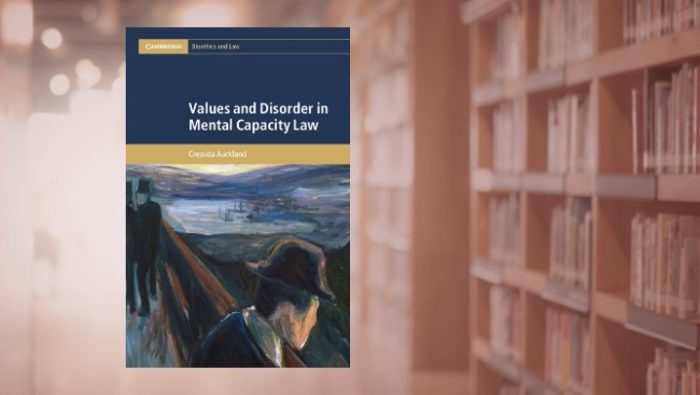
Putting ‘Values’ Back in Mental Capacity Law

English law’s all-or-nothing approach to determining capacity, as set out under the Mental Capacity Act 2005 (MCA), has long been subjected to critiques written from philosophical, socio-legal, and human rights perspectives. In short, while adults deemed to have capacity in relation to a decision (ss.2–3 MCA) are free to do as they wish, even in life-threatening situations, those found to lack such capacity will invariably have that decision made on their behalf, in their ‘best interests’ (s.4 MCA). Since the widespread adoption of the UN Convention on the Rights of Persons with Disabilities (UNCRPD) and the growth of critical disability scholarship in recent decades, this binary approach has been criticised for ignoring the reality of mental in/capacity, which is much more nuanced than the law represents, and for denying the autonomy of those falling on the wrong side of capacity—often people with disabilities—by allowing their judgment to be substituted on paternalistic grounds.
Cressida Auckland’s monograph, Values and Disorder in Mental Capacity Law (CUP 2024), contributes to this literature. Drawing on case law and Auckland’s interviews with doctors, this book offers an eloquent and substantial critique of the MCA framework and original recommendations for reform. As the title suggests, its focus is on the ‘values’—or the lack thereof—in the MCA framework. Auckland’s thesis is that the MCA’s value-neutral approach to assessing capacity is both unrealistic and undesirable. In fact, the capacity test’s superficial preoccupation with the individual’s cognitive process (whether one can understand, retain, and weigh information relevant to the decision in question) only obscures the value judgments assessors do make. What Auckland suggests, then, is to put these values back in their place in the capacity assessment.
This argument is elucidated clearly and logically over six substantive chapters. Chapter 1 gives an overview of the legal framework governing mental capacity and its theoretical foundation in liberal understandings of individual autonomy and the limits of the state. Chapter 2 begins to unravel the MCA’s criteria for capacity. Through a detailed analysis of the case law, Auckland persuasively argues that engagement with the content of the decision—and the individual’s values underpinning it—is essential to evaluating the rationality of the decision-making process. Further, she makes the cogent observation that assessors are, indeed, more concerned with the disordered nature of values and beliefs underlying the individual’s decision than their cognitive process.
Following from this, Chapter 3 turns its attention to the fundamental question of why disorder matters in the context of capacity. Is it possible to distinguish disordered from non-disordered beliefs and values? If so, how exactly does mental disorder impact upon autonomous decision-making? A broad array of literature from philosophy, psychiatry, and bioethics is drawn upon to answer these questions. Having thus identified the value-laden nature of capacity assessments in practice and how mental disorder is understood to affect autonomy, Auckland presents her recommendation for reform in Chapter 4: the addition of an ‘authenticity’ limb to the capacity test, which would bring judgments about the individual’s values and beliefs to the fore.
Finally, Chapters 5 and 6 address the problem that fringe cases of in/capacity will exist so long as the ‘cliff-edge’ approach to capacity remains (p.185). Auckland proposes incorporating in the law a ‘presumption that the agent’s wishes and feelings are determinative of what is in their best interests, except where giving effect to them will expose the agent to a risk of significant harm’ (p.226). This would allow many of those deemed to lack capacity to nevertheless make decisions according to their authentic values.
Overall, Values and Disorder provides readers with an accurate and comprehensive evaluation of the English mental capacity legal framework grounded in doctrinal analysis and supplemented by empirical research. Though the case law analysed will be largely familiar to those working in mental capacity law, Auckland’s synthesis of the cases and related literature offers new insights into the gulf between the law and practice in this area. It should also be noted that the reforms proposed in the book are intended to be pragmatic, with the aim of ‘softening’ rather than doing away with the ‘cliff edge’ of capacity altogether (p.226). Auckland’s justification for this is that a shift from the current substituted decision-making regime to one which supports people of all cognitive abilities to make their own decisions, as the UNCRPD mandates, would be extremely unlikely in the near future.
Nevertheless, given the monograph’s focus on autonomy and empowerment, readers might expect more space to be given to disability perspectives, which are noticeably absent throughout the book, especially from the discussion about mental disorder in Chapter 3. Nor is there recognition of the epistemic injustice which occurs in the context of capacity and best interests assessments, where medical and legal experts remain the arbiters of what is ‘authentic’ to an individual and what constitutes ‘significant harm’ to them.
Within the current paradigm, Auckland’s proposed reforms certainly offer the prospect of greater consistency and better protection for assessors; they should also spark further debate on how the MCA (and the related Mental Health Act) could sensibly be improved and challenged in the future.

